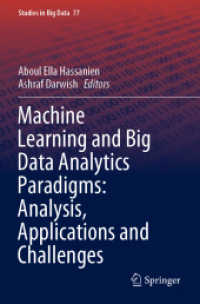- ホーム
- > 洋書
- > 英文書
- > Psychology
Full Description
Computational modeling has tremendously advanced our understanding of the processes involved in normal and impaired reading. While previous research has mainly focused on simulating reading aloud of monosyllabic words in English, the present special issue highlights some new directions in the field of word recognition and reading aloud. These new lines of research include the learning orthographic and phonological representations in both supervised and unsupervised networks, and the extension of existing models to multi-syllabic word processing both in English and in other languages, such as Italian, French and German. The special issue also covers hotly debated issues concerning the front-end of the reading process, the neural plausibility of current models of word recognition and naming, the viability of Bayesian approaches to understanding reading, as well as the long-standing opposition between rule-based and statistical learning. Finally, this special issue includes simulation work on novel benchmark phenomena, such as the effects of fast phonology, masked onset priming and syllabic neighbourhood. Altogether, the present special issue provides a critical analysis and synthesis of current computational models of reading and cutting edge research concerning the next generation of computational models of word recognition and reading aloud.
Contents
D.E. Sibley, C.T. Kello, M.S. Seidenberg, Learning Orthographic and Phonological Representations in Models of Monosyllabic and Bisyllabic Naming. S. Dufau, B. Lété, C. Touzet, H. Glotin, J.C. Ziegler, J. Grainger, A Developmental Perspective on Visual Word Recognition: New Evidence and a Self-Organizing Model. C.J. Davis, SOLAR Versus SERIOL Revisited. P. Mousikou, M. Coltheart, S. Saunders, Computational Modeling of the Masked Onset Priming Effect in Reading Aloud. K. Diependaele, J.C. Ziegler, J. Grainger, Fast Phonology and the Bi-modal Interactive Activation Model. J.S. Bowers, Does Masked and Unmasked Priming Reflect Bayesian Inference as Implemented in the Bayesian Reader? C. Perry, J.C. Ziegler, M. Braun, M. Zorzi, Rules Versus Statistics in Reading Aloud: New Evidence on an Old Debate. G. Pagliuca, P. Monaghan, Discovering Large Grain-sizes in a Transparent Orthography: Insights from a Connectionist Model of Italian Word Naming. M. Zorzi, The Connectionist Dual Process (CDP) Approach to Modeling Reading Aloud. M. Conrad, S. Tamm, M. Carreiras, A.M. Jacobs, Simulating Syllable Frequency Effects Within an Interactive Activation Framework.






